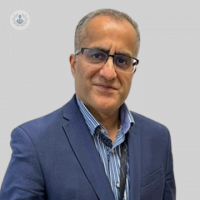Hernia surgery: An expert insight
Written by:While some hernias may be managed with conservative methods, others may require surgical repair for effective treatment and symptom relief.
Here, Mr Hitesh Patel, renowned consultant general, laparoscopic and colorectal surgeon, offers his expert insight into hernia surgery.

When is hernia surgery required?
Hernia surgery becomes necessary when a hernia causes persistent pain, discomfort, or other complications.
Additionally, surgery is often recommended if the hernia is at risk of becoming incarcerated or strangulated. Incarceration occurs when the hernia can’t be pushed back into place, and strangulation is a serious complication where blood supply to the herniated tissue is compromised.
How is hernia surgery (open hernia surgery and laparoscopic hernia surgery) performed?
Open hernia surgery
Open hernia surgery is the traditional approach to hernia repair.
During open hernia surgery, a single large incision is made over the hernia site, allowing the surgeon direct access to the herniated tissue. The protruding tissue is then carefully pushed back into place.
To reinforce the weakened area and prevent recurrence, a mesh is often used and secured in place using sutures.
Laparoscopic hernia surgery
Laparoscopic hernia surgery is a minimally invasive approach to hernia repair associated with shorter recovery times and less postoperative pain compared to open surgery.
During laparoscopic hernia surgery, several small incisions are made near the hernia site. A thin, flexible tube with a camera (called a laparoscope) and specialised surgical instruments are then inserted through the incisions. The surgeon uses these tools to push the herniated tissue back into place.
Similar to open hernia surgery, a mesh is often used to reinforce the weakened area, and secured in place using sutures. The small incisions near the hernia site are closed using sutures or adhesive strips.
What are the potential risks and complications involved?
Hernia surgery is generally considered a safe procedure. However, it’s important to be aware of the potential risks and complications involved.
Risks and complications include:
- Infection: Infection at the incision site is a rare but possible complication.
- Bleeding: Excessive bleeding during or after hernia surgery is a potential risk.
- Nerve damage: In rare cases, nearby nerves may be affected during hernia surgery, leading to temporary or permanent numbness.
How long is the recovery period after hernia surgery?
Recovery after hernia surgery can vary, depending on the patient’s age and overall health, the complexity of the surgery, and the specific location of the hernia.
Patients may feel significantly better within a few weeks, but complete healing may take several weeks to months. The incision site will continue to heal and fade over time.
When can I return to normal activities, including work and exercise?
The timing for resuming normal activities post-hernia surgery depends on factors such as the patient’s individual healing, the complexity of the surgery, and the nature of the patient’s daily tasks.
Light exercise, such as walking, can be resumed within the first week after hernia surgery. Strenuous exercise and heavy lifting, however, should be postponed until week six.
Most patients can return to desk jobs within a week or two, while jobs involving heavy lifting will require a more extended recovery period.
If you require hernia surgery and you would like to consult your options with an expert, don’t hesitate to book an appointment with Mr Hitesh Patel via his Top Doctors profile today.


